
2023
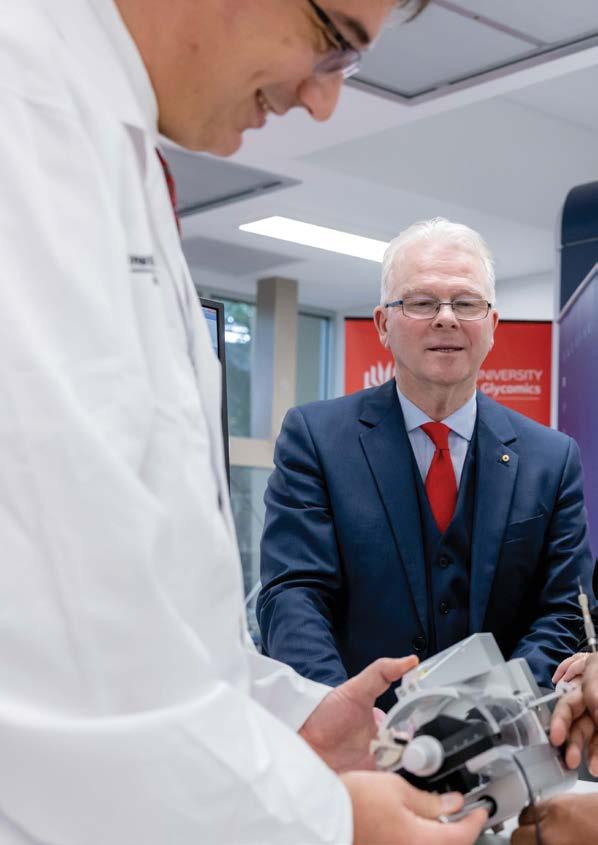

“We know from cancer researchers, that access to better technology and equipment is the key to significantly shifting the dial to improve the prevention, detection and treatment of all cancers. We look forward to working with you to secure a better future.”
 Kerry Strydom Chief Executive Officer
Kerry Strydom Chief Executive Officer
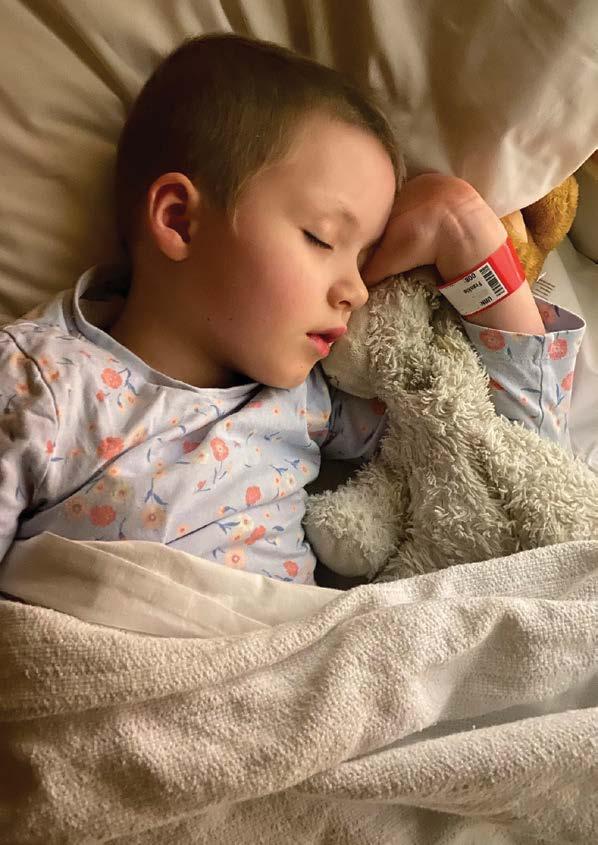
“Cancer is about statistics and research – but it’s also about somebody’s daughter or son who is sick and scared. No-one should have to go through what my little girl went through.”
Elyse, Frankie’s mum.
Frankie McDonald was just four years old when she was diagnosed with Acute Lymphoblastic Leukaemia (ALL). Franke’s type of cancer, ALL has a 90% chance of survival. This last Christmas, Frankie took her last chemotherapy tablet, Frankie is currently in recovery and and thriving in her first year of primary school.
Aspiring to a world
without cancer
ACRF’s Impact Philanthropy Initiative
WELCOME TO THE ACRF ACCELERATE
PROGRAM, designed in line with our mission as a leading, independent Australian charity to reach a world without cancer.
The Accelerate program is a structured philanthropic program administered by Australian Cancer Research Foundation (ACRF) that enables generous supporters to make a real impact by supporting some of Australia’s most significant and cutting-edge cancer research programs.
ACRF has worked with health economists and financial advisors to present the program in a way that provides prospective donors with a unique philanthropic opportunity to evaluate and provide funding towards promising cancer research projects in Australia today.
To apply a similar due diligence as you would for any significant financial decision and to help you assess the funding opportunities available, a unique model has been created to articulate the anticipated future impact of each project.

This bespoke approach to cancer research funding allows donors to see exactly how their contributions will benefit the lives of others, not only now, but well into the future. With so much at stake, and so many lives touched by cancer, we invite you to help make a significant difference by selecting a program and pledging your support.
Since 1984, ACRF has facilitated the investment of over $174M IN 82 CANCER PROJECTS AUSTRALIA-WIDE
The Foundation provides privately funded grants of between $1M and $10M to support VITAL TECHNOLOGY, EQUIPMENT AND INFRASTRUCTURE to accelerate cancer research
ACRF’s year-on-year philanthropic investment equates to around 30% of all NON-GOVERNMENT FUNDING IN CANCER RESEARCH
INFRASTRUCTURE IN AUSTRALIA
SEE PAGE 21
ACRF acknowledges the traditional custodians of the land we work on and their continuing connection to land, culture and community. We pay our respects to Elders past, present and future.
LETTER FROM OUR CHAIR
2022 saw Australian society and the world endure a global pandemic for the third year in a row. This time we witnessed positive effects of rapid and ground-breaking scientific research with nine vaccines available across the world to stop the Covid-19 spread. In Australia, we learnt to live with the Covid-19 virus as restrictions were cautiously lifted as vaccination targets were met across the nation, allowing the country to return somewhat to life before the pandemic.
The pandemic has challenged the cancer research community globally. Some researchers were unable to work effectively from home, where clinical trials required faceface encounters and lab research was at different times disrupted and suspended due to Covid-19 restrictions.
Despite these challenges, vital cancer research has persisted, and its importance on scientific evolution and progress continues to remain essential to get us to the day when cancer can be managed simply, with reduced loss of life. Until this time, it is imperative that we give scientists the tools they need to innovate and continue to be endlessly curious.
ACRF Accelerate donors play a key role in our ability to continue to support brilliant scientific minds and pioneering research.
In 2021, our grants created opportunities for revolutionary cancer research, including the establishment of a unique hub for exciting and revolutionary cancer glycomics

research (opened in 2022), world-leading research into the use of theranostics (a personalised approach to cancer treatment combining therapy and diagnostics). A world-first mobile lung cancer multiplatform research facility focused on early detection research for lung cancer – the leading cause of cancer deaths globally.
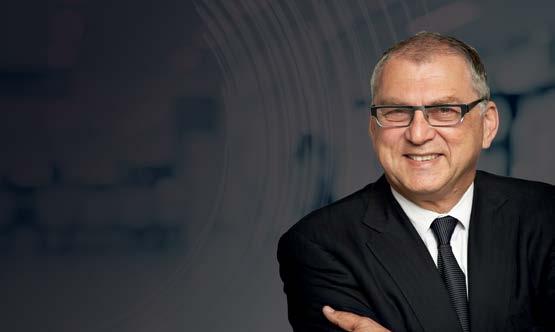
In 2022 we continued supporting scientific exploration into personalised medicine and theranostics through funding to help establish a world-class radiochemistry lab. Bringing together experts in cancer biology, chemistry, translational oncology and clinical trials across multiple institutions and with industry collaborators, this will create an innovative world-class discovery and translational cancer research program. Enabling new targets and therapeutics to be developed and taken into the clinic, combined with molecular imaging of targets and drugs to optimise treatment will progress towards optimal outcomes for cancer patients.
All projects open for funding since inception have been assessed and evaluated by Australia Cancer Research Foundation’s (ACRF) esteemed Medical Research Advisory Committee (MRAC). ACRF utilises our unique Impact Model to anticipate the potential outcomes associated with each project. So, you can have confidence that every donation will have a real and tangible result. It is such a privilege to be able to invite you to join us and be part of ACRF Accelerate.
With your support, we know we can reach life-changing outcomes for those impacted by this devastating disease. Thank you for your generosity and commitment to backing brilliant cancer research.
Tom Dery AO
YOUR SUPPORT WILL HELP BACK BOLD, BRAVE AND BRILLIANT CANCER RESEARCH SO THE PEOPLE YOU LOVE DON’T MISS OUT ON THE CANCER RESEARCH THEY NEED.
Supporting ACRF means backing projects that push boundaries and blaze new trails. You’re giving scientists access to cutting-edge equipment that drives innovation — potentially saving millions of lives.
BACKING BRILLIANT is what Australian Cancer Research Foundation does.
We know that cancer research brilliance goes further and faster when it’s backed by technology.
So we ask highly-esteemed cancer researchers to select the cancer research they believe in, and we supercharge it with technology.
It works!
ACRF’s approach has already saved the lives of Australians who would otherwise die from their cancer or pay an unacceptable price for more time.
But this powerful impact is limited.
By funding.
We are independent and rely on private support, and the less funding we have, the less work we can support.
It means we have to say ‘no’ to brilliant cancer researchers whose work has astounding, ground-breaking, dial-shifting potential.
It means we say ‘no’ to cancer research that could save the life of the two in five Australian’s who’ll get cancer in their lifetime.
That could be someone you know – someone you care about – your family, your friends, your community, perhaps even you.
ACRF Accelerate explains our unique approach to philanthropy, supporting cancer research across all cancers. It showcases ACRF projects across leading medical research institutes Australia-wide, that require your support. ACRF Accelerate aligns your support to best fit with your goals with confidence.
We look forward to you joining our mission of getting closer to a world without cancer.
Kerry Strydom

LETTER FROM OUR CEO
Accelerate 2023 7
Visionary cancer research across Australia
DESPITE MANY ADVANCES in how we treat and manage cancer, it remains one of Australia’s leading causes of early death. The emergence of new technologies provides opportunities to advance cancer research like never before. Now more than ever, researchers need access to the latest equipment to accelerate towards a world without cancer.
Since 1984, through ACRF, donors have contributed over $174M to 82 pioneering cancer research projects across 43 institutions in Australia.
Past ACRF funding has a proven track record and has been used, for example, to:
• provide critical funding needed to fast track development of the cervical cancer vaccine
• create new medical devices for cancer imaging and targeted radiotherapy
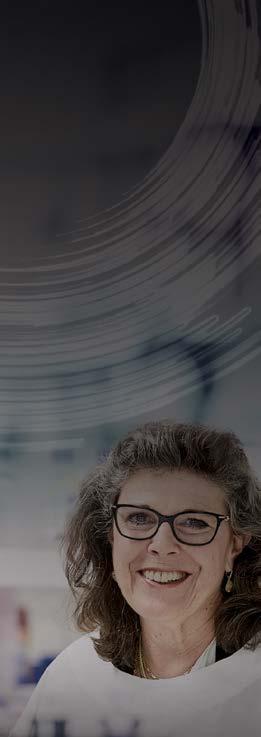
• deploy CRISPR technology for gene editing (manipulate or repair gene function)
• establish robotics, libraries of known and clinically approved drugs, expanded tumour bank facilities and information management system to investigate new personalised cancer treatments for children diagnosed with high-risk cancer
• investigate early detection of lung cancer using specialised equipment for exhaled breath analysis
• significantly expand the capability of the Australian Synchrotron Micro Crystallography (MX2) beamline for enhanced protein analysis
• develop a library of information to advance scientific discovery and enhance clinical treatment worldwide. This database of tens of thousands of samples (of all types of cancer) will mean clinicians can effectively narrow down the best available treatment to target a cancer patient’s individual diagnosis, without having to waste time trialling medications.
Thanks to ACRF’s supporters, research discoveries and significant outcomes have already been made possible but there is still so much more work to be done.
8 ACRF AccelerateAccelerate 2023
“No other organisation in Australia offers the wonderful infrastructure support for cancer research like ACRF. Their funding has, for many research centres in Australia, been so vital to speeding up the discovery process.”
Professor Michelle Haber AM, Chief Investigator
A unique model and a proven track record

AS A LEADING INDEPENDENT CHARITY


ACRF brings together outstanding expertise from medical research organisations across Australia to deliver visionary programs of research.

Each year, ACRF seeks to understand what researchers need most to achieve continued outcomes for better prevention, detection and treatment of all cancers.
Initially, the requirement was for ACRF to fund buildings to provide researchers the space to work. Fast forward to today, and the vital need is support in acquiring the latest technology, ranging from equipment to virtual infrastructure.
Technology has proven to play a significant role in improving cancer outcomes. Past projects funded by ACRF have delivered significant outcomes and real, human impact.
All grant applications undergo a rigorous evaluation and selection process by our respected ACRF Medical Research Advisory Committee and esteemed ACRF Board of Trustees. Beyond award, ACRF governance requires grant recipients to report annually on progress and outcomes.
As showcased in the ACRF Accelerate projects, our Foundation’s support typically leads to further significant investment by both government and commercial bodies, leading to increased impact of every dollar you donate.
LEARN MORE about ACRF’s history and the remarkable research we are proud to support.
Contact: philanthropy@acrf.com.au
Your support of the ACRF Accelerate
PROJECTS IN THE ACRF ACCELERATE PROGRAM are recommended by the ACRF Medical Research Advisory Committee (MRAC) and approved by ACRF’s Board of Trustees.
Previous projects ACRF has funded, with the support of donors, include Professor Ian Frazer’s development of a cervical cancer vaccine for which ACRF provided the seed funding. Thanks to a national immunisation program that followed, Australia is set to be one of the first countries to effectively eliminate cervical cancer.

JOIN A PHILANTHROPIC PROGRAM that funds trailblazing pioneering cancer research projects
HAND SELECT and contribute to world-class project/s that are meaningful to you

REQUEST more detail of projects in line with your ambitions
FOLLOW THE PROGRESS at your own pace through updates and reports
ENABLE groundbreaking discoveries that could transform the health and wellbeing of our global community. Join ACRF Accelerate today.
program will help researchers explore visionary ideas
“Being awarded a grant by ACRF is some of the highest recognition that’s possible to achieve in this field.”
Emeritus Professor Ian Frazer AC, University of Queensland and grant recipient for the development of the world’s first cervical cancer vaccine.
ACRF’s framework for measuring impact
TO ESTIMATE
THE ANTICIPATED OUTCOMES
FOR THE ACRF ACCELERATE PROGRAM, leading health economists have been engaged to assist donors and the broader community to better understand how each project contributes societal, intellectual and financial benefits.
HUMAN IMPACT is defined as benefits which accrue to the people directly impacted by the investment. This includes direct health benefits such as reductions in the risk of future events, as well as improvements in life expectancy and quality of life. Other indirect human benefits include productivity and financial benefits such as reductions in out-of-pocket healthcare expenditure.
While there is no agreed international framework to determine the value of research programs, it is generally focused on the scientific, social and economic factors.
SOCIETAL IMPACT is defined as benefits which accrue to people indirectly impacted by the investment. This includes people within a defined social network, such as carers and family, as well as broader society. Potential benefits include reductions in carer burden and the associated changes in productivity.
LEVERAGE IMPACT is defined as additional financial accretion resulting from the initial investment. This includes additional infrastructure, allied and complementary funding or further in-kind support that is contingent on the investment.
INTELLECTUAL IMPACT is defined as the knowledge and occupational outcomes from the investment in research. This includes new research, medical or scientific jobs and the contribution of these jobs to the institution and the broader economy. Research and knowledge outputs include scientific publications, changes in policy or new technologies and their associated economic impact.
*All estimates provided for the quantitative and qualitative benefits arising from each project were obtained from the researchers and published information and are provided for guidance only.
Accelerate 2023 11
Cancer research landscape
WHAT IS CANCER
Cancer is described as abnormal cell growth within a person. These cells multiply uncontrollably, invading healthy tissue.
The body has natural systems to prevent the growth of cancerous cells by either repairing the damage to the DNA or forcing the cell to die if the damage is too great. Cancer occurs when these inbuilt defence mechanisms fail. The term ‘cancer’ describes a group of diseases that share this characteristic. Cancers are usually classified according to the location in the body where the abnormal cell growth began.
WE’VE COME A LONG WAY
The latest report from the Australian Institute of Health and Welfare (AIHW) shared that there are more than 1 million people alive in Australia who have previously been diagnosed with cancer. Progress in cancer research has meant that outcomes and survival statistics for those diagnosed with cancer in the past 30 plus years has improved considerably (during 1987–1991, 5 in 10 (51%) people survived for at least 5 years after their cancer diagnosis; more recent figures are closer to 7 in 10 (70%) people surviving at least 5 years).
This enormous improvement in survival rates has unfortunately not been consistent across all cancer types – meaning there is still a huge job to be done in better managing and treating this disease.
CANCER IN AUSTRALIA – STATISTICS
The AIHW Cancer in Australia 2022 report estimates:

• Around 162,000 new cases of cancer were diagnosed in Australia. That’s about 444 people per day.
• The most commonly diagnosed cancers in males are prostate cancer, melanoma of the skin, colorectal cancer and lung cancer.

• The most commonly diagnosed cancers in females are breast cancer, colorectal cancer, melanoma of the skin and lung cancer.
• Devastatingly around 137 people die each day from cancer in Australia. Lung cancer is the leading cause of death from cancer, followed by colorectal cancer, pancreatic cancer, prostate cancer and breast cancer.
• 776 children aged 0–14 years will have been newly diagnosed with cancer in Australia (405 boys and 371 girls).
• 88 children aged 0–14 years will have died from cancer in Australia (53 boys and 35 girls).
• The current five-year relative survival rate for all childhood cancers combined is 86% (2014–2018, latest confirmed data). This is an 11% improvement in five-year relative survival rate for all childhood cancers combined since 1994-1998.
• Although the survival rate has increased thanks to research, of those children who do survive, two-thirds will have significant long-term treatment side effects, including organ dysfunction, neurocognitive deficits, impaired fertility, and secondary malignancies.
CANCER
still claims 137 lives each day in Australia. Please back research to help reduce this number. Contact philanthropy@acrf.com.au
in
 Professor Doug Hilton AO Chair of ACRF’s Medical Research Advisory Committee.
Professor Doug Hilton AO Chair of ACRF’s Medical Research Advisory Committee.

infrastructure and technology that advances cancer research and helps our researchers make discoveries that improve the lives of cancer patients and their families. We thank ACRF supporters for their faith in our ability to understand, prevent and find new treatments for people with cancer.”
Accelerate 2023 13
The impact of past funding
Backing capabilities to advance understanding cancer complexities and develop new and improved treatments – WEHI (Formerly Walter and Eliza Hall Institute of Medical Research)

Over the past 20 years ACRF has proudly supported projects undertaken by the extraordinary team at WEHI. We are proud to have provided over $9 million of funding to investigate cellular protein structures, cancer cell biology, critical mutation identification and gene editing, as well as cancer complexity and therapeutic resistance. This ACRF supported research has led to many important discoveries including:
• Identification of the importance of the protein BCL-2 and its role in helping cancer cells to survive indefinitely.
• Development of the BCL-2 inhibitor, “Venetoclax”, which has proven effective in providing remission in patients with advanced leukaemia and for whom conventional treatment options had been exhausted.
• Venetoclax has been approved for treatment of some patients with chronic lymphocytic leukaemia (CCL). From December 2021 this extended to Acute Myeloid Leukaemia (AML).

• Clinical trials are underway to test the application of Venetoclax in other types of blood, breast, prostate and lung cancers.
• Research continues to identify reasons why resistance may emerge in some patients.
“With targeted therapies we are at the dawn of the era of understanding how to use these new, smart anti-cancer drugs. Over the next decade or so we will work out how best to use them to address cancers and metastases.”
Professor Andrew Roberts
Joint lead investigator for the ACRF Program for Resolving Cancer Complexity and Therapeutic Resistance.
14 Accelerate 2023
By investigating cancers at a single cell level, using equipment funded by ACRF, researchers seek to deal with the diversity of cancers and variability in the way that patients like Fiona respond to therapies.
At 49 years of age, Fiona received news that she had renal cell carcinoma – a rare cancer diagnosis for a woman. Of course, she was devastated at what the cancer could mean for her family; and she so wanted to see them grow up and be part of their futures.

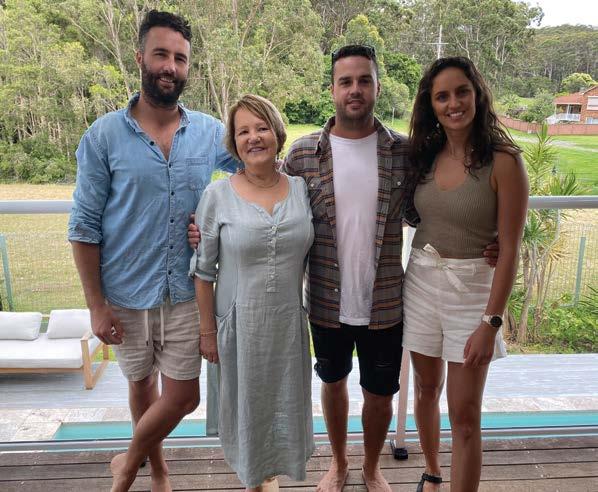
As an oncology nurse, herself, Fiona has devoted her life to caring for other people with cancer, so she knew what to expect. Placing herself in the expert hands of her colleagues, she underwent gruelling surgery to remove her kidney and hoped that was the end of her terrifying brush with cancer.
Six months later, when she began experiencing neurological symptoms, suspecting the worst, a CT scan showed the cancer had metastasised to her brain.


The cranial surgery was a success – and thanks to research a breakthrough in cancer treatment gave her the option of a new oral medication. For 10 years, she took that drug every day and it kept the cancer at bay.
Sadly, the cancer returned, and a biopsy revealed the tumour was another recurrence of her renal cancer - the treatment keeping her cancer in check for 10 years had failed.
Continuous research gives hope to people like Fiona, investigating options for different, targeted therapies through a better understanding of treatment resistance.
“I’m so thankful to have this hope. There are still so many things to look forward to in my children’s lives.”
Fiona, cancer survivor.
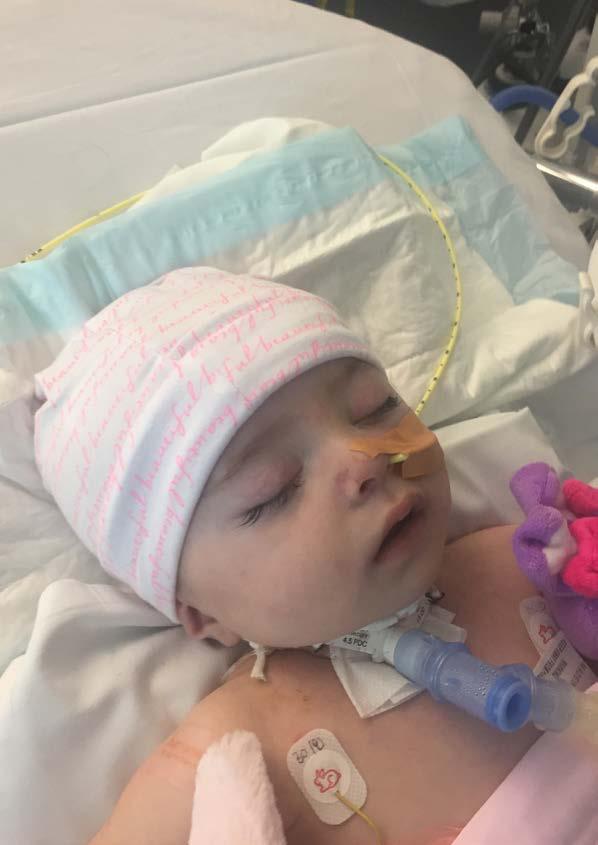

16 Accelerate 2023
“This was a child destined to die. But a few years on, Ellie is healthy, a normal child in every respect.”
Professor Michelle Haber AM, Executive Director, Children’s Cancer Institute.
A bold and heart-warming mission of zero deaths from childhood cancer
– CHILDREN’S CANCER INSTITUTE
Since 2014, ACRF has been a proud supporter of a world-leading precision medicine program for children with high-risk cancers – The Zero Childhood Cancer Program (ZERO). Based on the premise that every child’s cancer is unique, the program aims to provide personalised treatment for each child – giving them the best possible chance of survival.
ZERO began in 2015 with funding from ACRF. The pilot study was in NSW, during which the platform needed to create a comprehensive and integrated precision medicine pipeline was set up and validated.

In 2017, a three-year national clinical trial was launched for children and young people up to 21 years of age with high-risk, rare and relapsed cancers – those with a less than 30% chance of survival. The aim of this trial was to test the practicality and impact of providing a comprehensive testing platform (including genomic analysis, drug screening and drug testing) to identify precision medicine treatments for children and young adults with high-risk cancer. Patients from all eight of Australia’s children’s hospitals were involved in the trial, which generated some truly remarkable results.
In 2023 ZERO will expand progressively to become available to all Australians aged 0 to 18 years with cancer, by the end of the year.
In 2019 ACRF provided funding to a subsequent program which was used to establish The ACRF Child Cancer Liquid Biopsy Program. This initiative is focused on both survival as well as quality of life, including reducing the trauma associated with invasive cancer procedures.
Above all, this program provides hope to the children and families who receive the life-changing news of a high-risk cancer diagnosis, children like Ellie.
Ellie was just eleven months old when doctors found a giant tumour in her chest. The mass was so huge it was pushing her tiny heart and lungs aside. Within a day she could no longer breathe by herself and was rushed into intensive care.
Ellie’s cancer was rare, aggressive and resistant to chemotherapy. Time was running out, and her devastated parents, Rob and Mina, faced the unthinkable prospect of having to say goodbye to their baby girl.

Researchers from of the Zero Childhood Cancer program, an initiative that was kick-started by ACRF funding, went straight to work analysing the genetics of Ellie’s tumour.
Using everything they’d learned about Ellie’s cancer, doctors and researchers working together identified the exact drug to target the tumour. Before her parents’ eyes, she came back from the brink of death.
Ellie continued to recover and today she’s a happy, healthy little girl – all thanks to generous people like you.
“We know that if Ellie had been diagnosed with this cancer a few years ago, she would have died. She is only alive today because of the Zero Childhood Cancer program.”
Mina, Ellie’s mother
Outcomes from a few ACRF Grants
OPTIMISING TREATMENT FOR CANCER PATIENTS
In 2015, ACRF awarded $10 million for six cutting-edge machines to establish the ACRF International Centre for Proteome of Cancer (ProCanTM) at the Children’s Medical Research Institute. The machines are custom-built to analyse tens of thousands of cancer protein samples from across the globe. The project will develop the first ever large pan-cancer database of proteomic and clinical outcome data. From this database of cancer proteins, doctors will be able to glean insights into which treatment options will be most effective for their patients, based on the unique make-up of their cells.
“The ProCanTM database will allow the development of tools that will improve the accuracy of cancer patients’ diagnosis and better tailoring of the treatment plan for individual patients, which will eventually improve patient outcomes”
- Professor Roger Reddel AO
KEY MILESTONES
• 2019: ProCanTM hit the milestone of analysing 10,000 samples, helping to develop a comprehensive library of the proteome of tumour types including neuroblastoma, lung, ovarian and breast cancer.


• 2020: Researchers obtained over 10,000 frozen tissue samples representing a broad range of cancer types, as part of what is set to be one of the largest proteomic studies to date.
• 2021: Progressed international collaborations on proteomic analyses of tumours with high clinical unmet need, including rare sarcoma subtypes, paediatric brain tumours and paediatric liver cancer. A series of technical improvements in the laboratory pre-processing of cancer samples to make them ready for protein analysis (proteomic analysis) by mass spectrometry, reducing the required time from 2 days to 4 hours and substantially increasing the reliability and reproducibility of this process.

OUT MORE about
FIND
the pioneering research ACRF is currently backing. Email philanthropy@acrf.com.au
THE WORLD’S FIRST CERVICAL CANCER VACCINE

In 1999 Professor Ian Frazer set out on a moon-shot mission to eradicate cervical cancer. Professor Frazer recognised that in order to eliminate this deadly disease, he would need to target Human Papillomavirus (HPV), the virus responsible for causing cervical cancer. In a project seed-funded by ACRF, Professor Frazer and his team discovered how to make HPV vaccine particles, which formed the basis of the world’s first cervical cancer vaccine. The vaccine protects young women from the cancer-causing strains of the HPV virus, significantly reducing the potential of a cervical cancer diagnosis.
“Observations from over the past ten years are that the HPV vaccines, if delivered effectively to the majority of 10-12 year old girls in the developing world from today forward, should lead to the global elimination of new cervical and other HPV associated cancers by 2050.”
- Emeritus Professor Ian Frazer AC, University of Queensland
KEY MILESTONES
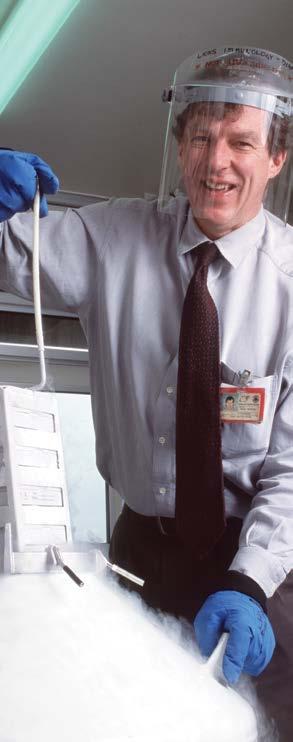
• 2006: The Therapeutics Goods Association (TGA) approves the world’s first cervical cancer vaccine, Gardasil, protecting young women form the strains of HPV that cause 70% of cervical cancers.
• 2007: The Australian Government implements the HPV Vaccination Program, vaccinating girls aged 12-13 years with Gardasil. In 2013 the Program is extended to boys aged 12-13 years.
• 2018: The TGA approves the Gardasil vaccine 9, which is subsequently rolled out in schools across Australia as parts of the HPV Vaccination Program. The vaccine protects young women from the HPV strains that cause 90% of cervical cancers.
• 2021: The Federal Government commits an additional $5.8 million of funding, to reach its goal of eliminating cervical cancer by 2035.
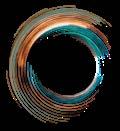
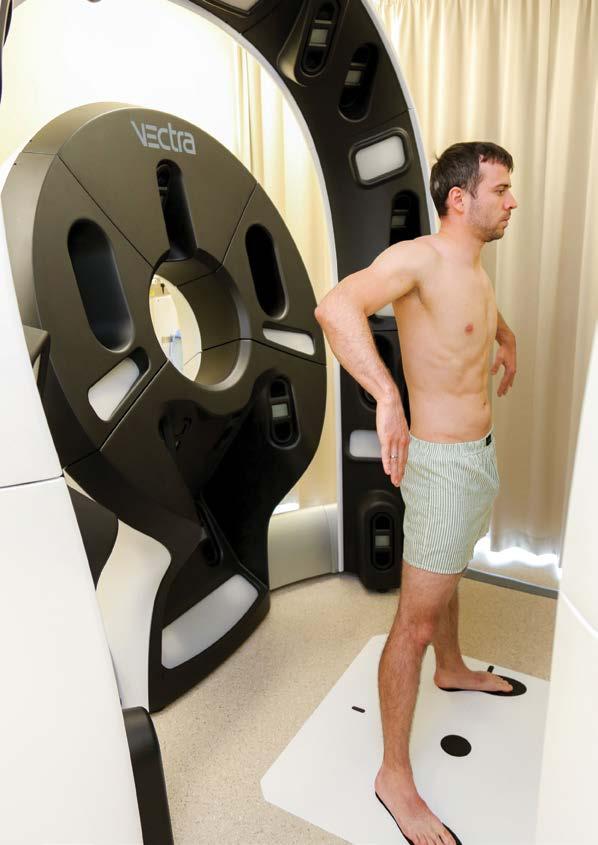
Vectra WB360 Imaging System 20 Accelerate 2023
“Early detection is the key to saving lives. Initiatives like this are a crucial step towards achieving our vision of a world without melanoma. ACRF’s supporters make our life-changing work possible.”
Professor H. Peter Soyer, ACRF ACEMID Chief Investigator
REVOLUTIONISING THE EARLY DETECTION OF MELANOMA
Melanoma kills more Australians each year than roadside accidents. To tackle this national health epidemic, ACRF granted $9.9 million to the University of Queensland in 2018 to establish the ACRF Australian Centre of Excellence in Melanoma (ACEMID). ACEMID uses sophisticated 3D imaging systems to produce whole-body scans that can be monitored over time. The imaging systems are being rolled-out in 15 research nodes across three Australian states, and will be used to produce patient ‘avatars’.
The medicine network allows specialist doctors to view a patient’s scans from any location, helping patients in rural and remote areas who may not have access to specialist care as most dermatologists are located in urban areas. The project will build 100,000 patient avatars, providing a comprehensive diagnostic tool for skin specialists and will be the largest database of melanoma in the world. Artificial intelligence will be developed to aid clinicians in diagnosis and ongoing monitoring of skin lesions enabling the earlier detection of melanoma.

KEY MILESTONES
• 2021: ACEMID is officially launched. ICT for telemedicine network developed. Delays incurred due to Covid-19 in procurement and installation of site Vectra’s (3D imaging units).
• 2022: 10 ACRF ACEMID sites installed with 8 sites actively recruiting subjects for the clinical trial.
• 2023: All study sites installed and actively recruiting.
• 2025: The project database of 100,000 avatars will be the largest in the world.
• Into the future: The ACEMID project is anticipated to reduce the number of people diagnosed with late-stage melanoma by 30%.
 LEARN MORE about the projects revolutionising cancer detection. Contact philanthropy@acrf.com.au
3D imaging of a patient’s skin surface for early detection of melanoma.
LEARN MORE about the projects revolutionising cancer detection. Contact philanthropy@acrf.com.au
3D imaging of a patient’s skin surface for early detection of melanoma.
Leading Australian cancer charity





FOUNDATION HISTORY
Australian Cancer Research Foundation (ACRF) was founded in 1984 by the late Sir Peter Abeles AC and the late Lady Sonia McMahon. The Foundation’s focus was established following a survey of several science and medical professionals asking what they needed most to progress cancer research in Australia.

ACRF grants awarded between 2016 and 2018 accounted for a significant 31% of all private non-profit expenditure on cancer research in Australia
At the time, the need was for physical buildings to conduct research activities. Joining Sir Peter Abeles AC and Lady Sonia McMahon in establishing ACRF were the late Mr John Boettcher OAM and the late Sir Ian Turbott AO CMG CVO. Both were well respected, prominent contributors to the Australian philanthropic community.
Sir Peter Abeles AC also enlisted the assistance of a trusted business associate, Mr Tom Dery AO, who remains a driving force in the Foundation serving as its chair for more than 25 years.
By 1988 ACRF had raised its first $1 million and, after careful consideration, awarded its first grant to the St Vincent’s Medical Research Institute in Sydney. The grant’s focus was to establish the ‘Centre for Immunology’ for research into immune mechanisms in cancer, including biochemical regulation of growth factors, utilising leukaemic, bladder and colon cancer cells.
Since 1984, ACRF has provided grant funding of over $174 million to 82 projects in 43 institutions across Australia. A network of bright minds the Foundation is incredibly proud to support.

ACRF’S APPROACH TO FUNDING:
Without any direct government funding, ACRF relies solely on donations to support its grant awards. With the current economic climate, shifts in government spending and decline in university budgets for capital, ACRF has become an even more crucial part of the Australian cancer research funding environment. The Foundation provides some of Australia’s brightest minds with the resources, tools and technology to enable groundbreaking discoveries that will have significant and longterm impacts on the lives of Australians, and the broader global community. (See page 11 for ACRF’s Project Impact Modelling.)
ACRF has agreements with several other cancer organisations to create combined impact. This collaborative funding is typically applied to personnel and other project elements that do not fall within ACRF’s funding scope. This derives incremental value through increasing efficiency in the cancer research sector in Australia.
To date, bilateral agreements are in place with several key Australian organisations including the Cancer Institute NSW, Ovarian Cancer Research Foundation, RULE Prostate Cancer, Snowdome Foundation, the Cancer Research Trust and the Australian Gynaecological Cancer Foundation.
ACRF’S PIVOTAL ROLE IN RESEARCH FUNDING
ACRF provides grants of between $1M and $10M for technology, equipment and infrastructure for cancer research. Its goal is to enhance, enable and accelerate cancer research across Australia to the maximum extent possible each year in order to achieve the vision of a world without cancer.
ACRF activities are conducted effectively and efficiently by four groups: Members of the Medical Research Advisory Committee (MRAC) and the Board of Trustees who all volunteer their time; our small team of fundraisers, marketing and administrative staff; and professional services support, where some services are provided probono.
Donations made through the ACRF Accelerate program may be fully allocated to the selected research projects, ensuring 100% of the donation goes directly toward the work of researchers.
The Australian Bureau of Statistics (ABS) report titled “Research and Experimental Development Government and Private Non-Profit Organisations, Australia 2018-2019” identifies private non-profit capital expenditure on medical research from 2014 to 2019 of $168M. ACRF grants awarded in this period totalled $64.9M, a significant 19% of this total amount. When removing land and buildings, this increases to 28%.
The ABS report shows that while the importance of investment in medical and health is recognised and government spending on Research and Development (R&D) is increasing overall (including labour and operating costs), there is reduced government spending on capital expenditure for R&D.
The Cancer Australia report titled “Cancer Research in Australia 2016 to 2018” indicates that private funding made up 26% of investment in cancer research projects.
Of this, 31% was provided by ACRF. This data supports what ACRF hears from researchers about the difficulty in securing capital funds for research and the importance of ACRF funding in the cancer ecosystem.
Typically, the number of valuable and worthy projects submitted to ACRF for funding outweighs the amount of funding available.
SUMMARY OF CASH FLOWS
BEQUESTS 51% FUNDRAISING 32% INVESTMENTS 17% INFLOWS 2015-2021 EMPLOYMENT COSTS 14% FUNDRAISING & WEBSITE 9% GRANTS GOVERNANCE 1% OFFICE FACILITIES 1% INVESTMENT MANAGEMENT 1% OUTFLOWS 2015-2021 RESEARCH GRANTS 74%
Accelerate 2023 23
ACRF Grant Journey
THE RIGOROUS GRANT SELECTION PROCESS begins with grant submissions for potential research projects.
Grant applications are shortlisted by the expert ACRF Medical Research Advisory Committee (MRAC) through a competitive evaluation.
PRINCIPLES
ACRF grant funding is based on the following principles, designed to manage risk and ensure maximum impact of investment in cancer research:
• To consider all aspects of cancer control - prevention, early detection, treatment and/or management - through research.
• To provide single capital investment grants for major scientific equipment and new research infrastructure.
• To invest in research by institutes, hospitals and universities with outstanding credentials and/or potential in cancer research, to facilitate new and sustainable programs and to provide platforms that will add to Australia’s cancer research capacity.
• To invest in projects that can demonstrate clarity of research vision and planning, strong leadership and experienced management.
• To drive collaboration and efficiencies by encouraging joint applications that pool the efforts of teams and institutions, so research questions can be answered more effectively and efficiently.
• To identify projects that can leverage ACRF grants to secure additional funding to deliver and sustain the project.
CATEGORIES
ACRF funds vital technology, equipment and infrastructure needed to develop better prevention, earlier detection and more effective treatment methods across all cancer types. Funding is available within the following categories:
• Capital works such as new buildings or additions to existing buildings.
• Major equipment such as scientific equipment and laboratory instruments.
• Virtual infrastructure such as cloud based storage capacity to support research projects.

• Specialised operating essentials (<25% budget) e.g. reagents (chemicals used in laboratory testing), or specialised software.
ACRF has a commitment to achieving the best possible clinical outcomes through high quality basic and translational research. Grant applications in support of this general philosophy are encouraged.
Each project is evaluated and selected according to these criteria:
• Research excellence
• Fit with cancer research globally

• Synergies or amplified outcomes
• Uniqueness and platform
• Opportunity to leverage funding
• Vision and planning
• Management and governance
• Budget
• Recognition of ACRF
The ACRF MRAC performs a detailed and competitive evaluation and interview process.
The ACRF MRAC recommends projects to the ACRF Board of Trustees who determine the grant funding allocation.
Grant awards are announced at a prestigious ceremony. The last few years have been hosted by His Excellency the Governor General of the Commonwealth of Australia and Her Excellency, joint patrons of ACRF.
After contracts are finalised, the project can get underway and will include:
• Commissioning of equipment
• Official facility opening
• Key results measured and recorded
• Progress reports written annually for seven years
Each project evidences potential for future impacts in these four key areas:
• Human
• Societal
• Intellectual
• Financial
ASSESSMENT AWARD GOVERNANCE OUTCOMES IMPACT
Accelerate 2023 25
Medical Research Advisory Committee
Professor Doug Hilton AO, BSc (Hons), PhD, FAA, FAHMS, FTSE

Chair of the ACRF Medical Research Advisory Committee

Appointed to the MRAC in 2008
Director, WEHI; Head, The Brain Cancer Centre; The Lorenzo and Pamela Galli Chair in Medical Biology; Professor of Medical Biology; Head, Department of Medical Biology and Honorary Principal Fellow, Department of Zoology, The University of Melbourne.
Professor Michael Brown MBBS, PhD, FRACP, FRCPA
Appointed to the MRAC in 2016
Director, Cancer Clinical Trials Unit, and Senior Consultant, Department of Medical Oncology, Royal Adelaide Hospital Cancer Centre; Clinical Professor, School of Medicine, The University of AdelaideAdjunct Professor, School of Pharmacy and Medical Sciences, University of South Australia; Head, Translational Oncology Laboratory, Centre for Cancer Biology, SA Pathology, Adelaide.
Professor David Cameron BA (Hons), DES, MA, MBBS, MSc, DES, MD, CCST, MRCP(UK), FRCPEd











Appointed to the MRAC in 2017
Professor of Oncology and Deputy Director of IHDP at the University of Edinburgh.
Professor Michelle Haber AM, BSc (Psych) (Hons), PhD, Hon DSc (UNSW), FAHMS, FAA
Appointed to the MRAC in 2012
Executive Director, Children’s Cancer Institute; Co-Theme Head, Molecular Targets and Cancer Therapeutics; Group Leader, Experimental Therapeutics; Conjoint Professor Faculty of Medicine, University of NSW.


Professor Geoff Hill MD
Appointed to the MRAC in 2008
Full Professor; José Carreras/E. Donnall Thomas Endowed Chair for Cancer Research, Division Head and Senior Vice President, Scientific Director of The Immunotherapy Integrated Research Center and Director of Hematopoietic Stem Cell Transplantation, Fred Hutchinson Cancer Center; Professor of Medicine, Division of Medical Oncology, University of Washington.
Professor Philip Hogg BSc (Hons), PhD
Appointed to the MRAC in 2003
Director, ACRF Centenary Cancer Research Centre, Centenary Institute.
Professor Ricky Johnstone, PhD, FAHMS
Appointed to the MRAC in 2019
Executive Director Cancer Research, Peter MacCallum Cancer Centre; Professorial Fellow (Professor), The Sir Peter MacCallum Department of Oncology, University of Melbourne; Associate Director of Laboratory Research, NHMRC Senior Principal Research Fellowship, Assistant Director of Research, Co-Head, Cancer Therapeutics Program, Head of Gene Regulation Laboratory, Peter MacCallum Cancer Centre; Senior Fellow in the Department of Biochemistry, University of Melbourne.
Professor Paul Lambert BSc, PhD
Appointed to the MRAC in 2014
NCI Outstanding Investigator; Howard M Termin Professor and Chair, Oncology and Director, McArdle Laboratory for Cancer Research, University of Wisconsin School of Medicine and Public Health; Member, NCI Board of Scientific Counselors.

Professor Peter Leedman AO MBBS, PhD, FRACP, FAHMS

Appointed to the MRAC in 2019
Director, Harry Perkins Institute of Medical Research, WA; Professor of Medicine, University of WA.
Professor Angel Lopez AO MBBS, PhD, FRCPA, FAA
Appointed to the MRAC in 2014
Head of Human Immunology, SA Pathology, Adelaide.
26 Accelerate 2023
Professor John Rasko AO, BSc (Med), MBBS (Hons), PhD, MAICD, FFSc(RCPA), FRCPA, FRACP, FAHMS






Appointed to the MRAC in 2016
Head of Department, Cell & Molecular Therapies, Royal Prince Alfred Hospital; Professor, Faculty of Medicine & Health, The University of Sydney; Head, Gene and Stem Cell Therapy Program, Centenary Institute; Senior Staff Specialist Haematologist, Sydney Cancer Centre, Royal Prince Alfred Hospital.
Professor Roger Reddel AO BSc (Med), MBBS, PhD, FRACP, FAHMS, FAA
Appointed to the MRAC in 2012
Director of Children’s Medical Research Institute
(CMRI), Westmead, Sydney; Sir Lorimer Dods

Professor, The University of Sydney; Head of CMRI’s Cancer Research Unit, Director of CellBank Australia and Co-Director of ProCan®
Professor Helen Rizos BSc (Hons1), PhD

Appointed to the MRAC in 2019
Professor, Cancer Research, Macquarie Medical School, Faculty of Medicine, Health and Human Sciences, Macquarie University.
Professor Clare Scott AM, MBBS, PhD, Melbourne FRACP




Appointed to the MRAC in 2019
Joint Division Head, Clinical Translation (Cancer), Laboratory Head, Cancer Biology and Stem Cells Division, Walter & Eliza Hall Institute; Chair, Gynaecological Cancer, Faculty of Medicine, University of Melbourne.
Professor Jennifer Stow BSc (Hons), PhD

Appointed to the MRAC in 2009
NHMRC Principal Research Fellow; Deputy Director (Research) and Group Leader, Cell Biology and Molecular Medicine Division, Centre for Inflammation and Disease Research, Institute for Molecular Bioscience, University of Queensland.

Professor Connie Trimble MD

Appointed to the MRAC in 2014
Professor, Department of Gynecology and Obstetrics; Department of Oncology; Department of Pathology, Johns Hopkins University School of Medicine, Baltimore, USA. Diplomate, American Board of Pathology, Diplomate, American Board of Obstetrics and Gynecology; Fellow of the American College of Obstetricians and Gynecologists.
Professor Mathew Vadas AO, BS, BSc(Med), PhD, DSc, FRACP, FRCPA, GAICD, FAHMS


Appointed to the MRAC in 1997, Chairman 2003-2007 Executive Director, Centenary Institute.
Professor.dr Sjoerd Van Der Burg PhD
Appointed to the MRAC in 2017
Sjoerd van der Burg is full professor in the Immunotherapy of solid tumors with emphasis on immunomonitoring. He heads the laboratory of Medical Oncology and leads the group of Experimental Cancer Immunology and Therapy at the Leiden University Medical Center, the Netherlands. He is also appointed as senior investigator at the Oncode Institute.
Dr Nic Waddell BSc, PhD
Appointed to the MRAC in 2022
Head of the Medical Genomics group and coordinator of the Cancer Program at QIMR Berghofer Medical Research Institute in Brisbane, Queensland; Member, Executive Committee for Australian Genomic Technologies Association; Member, Australian Genomics; Research Committee Member, Cure Cancer Australia; Member, Queensland Genomics Community Advisory Group; Co-founder and Board Member, genomiQa; Cancer Institute NSW Research Committee; Associate Member, Australian Academy of Health and Medical Science Mentoring Scheme.
Emeritus Professor Ian Frazer AC, MBChB (Edin), MD, FRS, FAA

Appointed to the MRAC in 2005, Chairman 2009-2017
Professor, School of Medicine, The University of Queensland; Head, Cancer Immunology Program, UQDI; Board Chair, TRI Foundation; Chair, Advisory Board, Medical Research Future Fund.
Board of Trustees
Mr Tom Dery AO BCom (Econ), MBA Chair – Trustee since 1 April 1994.


• Worldwide Chair, M&C Saatchi (Retired) • Chair, AIME Inc • Leadership Council, World Justice Project
Mr Greg Camm MBA, BBus, CPA, MAICD Trustee since 6 December 2000.




• Director, Data Action Pty Ltd • Chair, AMIST Super
Mr Russell Caplan LLB, FAICD, FAIM Trustee since 25 March 2011.



• Chair, Horizon Roads Pty Ltd • Non-executive Director, Aurizon Holdings Limited • Director, St Kilda Football Club
Mr Tim Crommelin BCom QLD, A.M.P. Hawaii, FSIA, MSAFAA Trustee since 29 March 2000.


• Chair, Morgans Holdings (Australia) Limited
• Chair, Eagers Automotive Limited • Deputy Chair, The Morgans Foundation • Director, The Brisbane Lions Foundation • Director, Senex Energy Limited • Director, University of Queensland Endowment Foundation
• Advisory Board, Queensland Brain Institute • Chair, University of Queensland Investment Advisory Board
Dr Dashiell Gantner BSc, MBBS, PhD, FCICM, FRACP Trustee since 10 December 2019.
• Staff Specialist in Intensive Care, Medical Organ Donation Specialist, Alfred Health Adjunct Senior Lecturer, Department of Epidemiology and Preventive Medicine, Monash University • Director, Alfred Intensive Care Unit Pty Ltd • Director, Cassandra Gantner Foundation
Mr Stephen Gerlach AM LLB, FACID Trustee since 15 November 1996.
• Chancellor, Flinders University • Former Convener, University Chancellor Council • Distinguished Fellow, Australian Institute of Company Directors • Chair, Psychosis Australia Trust • Director, Beston Pacific Asset Management Pty Ltd Group • Director, Beston Global Foods Ltd • Director, The General Sir John Monash Scholarship Foundation
• Director, Nuco, Boqueria, Adela International Pty Ltd
• Chair, Jianguo, K-OSSS and K-OSSS II Pty Ltd
• Director, Black Gantner Asset Management LLC
Ms Jennifer Hewett BA, MA Trustee since 20 September 2012.


• National Affairs Columnist, The Australian Financial Review


Professor Peter Høj AC MSc, PhD, DUniv mult., FAA, FNAI(US), FTSE Trustee since 13 March 2020.
• Vice Chancellor and President, University of Adelaide
• Director, Group of Eight • Member (ex officio) Universities of Australia• Steering Group Member, IP Group Australia Steering Group
Mr Peter Jones BSurv, LLB, FCIS, FGIA Trustee since 20 June 2005.




• Senior Commercial Counsel, Hall & Wilcox
Air Chief Marshal Sir Angus Houston AK AFC (Ret’d) Trustee since 23 November 2011.
• Chancellor, University of the Sunshine Coast • Chair, Canberra Symphony Orchestra • Chair, UNSW Canberra Advisory Council • Chair, Murray Darling Basin Authority
• Chair, Supershock • Advisory Board Member, Lowy Institute Board • Member, GreaterGood Canberra • Director, Sunshine Coast Mind and Neuroscience Thompson Institute • Consultant, Ernst and Young • Visiting Fellow, Australian National University – National Security College
Dr Ian Brown BSc, MSc, PhD, Dip Bus Stud, Dip Ed, FTSE, FAST
Trustee since 23 March 2022
• Director, Preserve Health Pty Ltd (Adelaide)
• Senior Councillor, The Cohen Group • Patron, Sunnyfield Independence • Patron, Stand Tall for PTS • Patron, Australian American Association (Canberra Division)
• Patron, Bravery Trust • Patron, Bomber Command


• Patron, European Alliance Against Depression Australian Chapter (WA) • Patron, The Centenary of ANZAC Centre

• Patron, Tropical Brain and Mind Research Foundation, Townsville • Patron, Kimberley Brain and Mind Foundation
• Patron, Literacy Acquisition for Pre-Primary Students (Kimberley, WA) • Ambassador, ShelterBox Australia
• Patron, ACRF International Centre for Cancer Glycomics
28 ACRF Accelerate
Mrs Cassandra Michie BEc, BComm, LLB, FCA Trustee since 29 October 2019.
• Director, PwC Foundation Pty Ltd • Director and Chair, Finance and Property Committee for the Wayside Chapel



Joint Patronage

His Excellency General the Honourable David John Hurley ACR DSC (Retd)

David Hurley joined the Australian Army in January 1972, graduating from the Royal Military College, Duntroon into the Royal Australian Infantry Corps. In a long and distinguished 42-year military career, his service culminated with his appointment as Chief of the Defence Force. On the 1st July 2019, he was sworn in as the Governor-General of the Commonwealth of Australia. Prior to being sworn in as Governor-General, David Hurley served as the 38th Governor of New South Wales from October 2014 – May 2019.
Since his appointment to Governor General, he has been a loyal and generous supporter of ACRF. We are so grateful for the commitment and kindness both he and Mrs Hurley have shown to the Foundation.
Mr Stephen Rix BEc, CA, FAICD Trustee since 1 December 2005.


• Chair, Avenue Bank Ltd • Director, Allen & Unwin Pty Limited
Her Excellency Mrs Linda Hurley

Mrs Hurley commenced her teaching career in 1976 and worked tirelessly as a committed educator until her retirement from full-time teaching in 2011. Along with supporting David Hurley in postings both here in Australia and overseas, she has been an active member of the community as a Pastoral Carer at the Canberra Hospital and Hospice.
Mrs Hurley brings her sunshine and warm spirit to her support of ACRF. We are so thankful for her kindness and her songs.
Their Excellencies at official opening ceremony for The ACRF Child Cancer Liquid Biopsy Program in May 2022.
Your giving journey with ACRF
IF YOUR JOURNEY WITH ACRF AND THE ACRF ACCELERATE PROGRAM HAS JUST BEGUN, or you’re already one of our valued donors, everyone at ACRF is thrilled to have your generous support.
Whether yours is a one-off or ongoing contribution, or you’re planning to leave a gift in your Will, you’ll be assigned a relationship manager who will be your personal contact at the organisation.
You will be in control of how often we contact you, and in what way. For example you can choose to receive regular electronic or printed updates, an annual report on your selected research project, or periodic phone call updates. At ACRF, we’re committed to ensuring you get what you need, when you need it, and in the manner you’d like to receive it.
We love sharing news and success stories with our donors. If these are of interest to you, you’ll also receive invitations to a range of special events throughout the year such as laboratory tours and openings, webinars and other special activities.
We respect our donors’ privacy and will not share your personal details with any other charity.

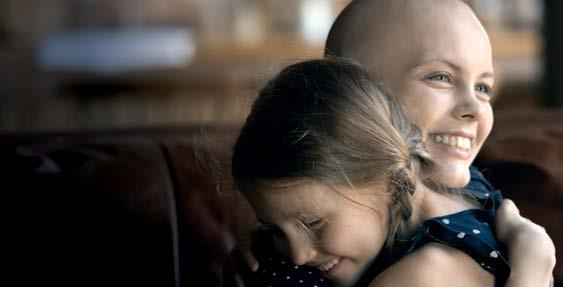
BE THE DRIVER of your donation experience when you support the ACRF Accelerate program
With your own DEDICATED RELATIONSHIP MANAGER, shape your personal experience by selecting your preferred updates, information and experiences
DEPENDING ON YOUR PREFERENCES, you can join us for lab tours, project openings, webinars and other engaging events
“This is where heartfelt donations from people wanting to solve the problem of cancer come together with projects that have the potential to do just that.”
30 ACRF Accelerate
ACRF Philanthropy Team
How to get in touch with ACRF
We look forward to meeting you to discuss your preferred contribution to the ACRF Accelerate program. To start this process, please contact us via email philanthropy@acrf.com.au
Kerry Strydom

CEO
Email: kstrydom@acrf.com.au
Mobile: 0414 266 598
Kerry joined ACRF in 2017 moving from a commercial career spanning global clinical research, FMCG and professional services. A Chartered Accountant (KPMG) with experience across business functions, Kerry leads the ACRF team with passion, focus and a personal commitment to advance to a world without cancer.

Emma Vincent
Head of Philanthropy and Development
Email: evincent@acrf.com.au
Mobile: 0402 636 509
Emma leads a small and effective team at ACRF that work closely with our generous donors to help Back Brilliant cancer research. Emma’s depth of experience in fundraising spans over 20 years with a specialised focus in individual giving, philanthropy and donor engagement.

Victoria Bonsey
Philanthropy Manager - National Lead

Email: vbonsey@acrf.com.au
Mobile: 0401 510 181

Victoria has been a professional fundraiser for over 21 years in the Australian charity sector. Since 2017 Victoria has been delighted to inform and connect supporters with ACRF, helping them back brilliant cancer research for accelerated outcomes and maximum impact.
Liz Wilson
Philanthropy and Engagement Manager
Email: lwilson@acrf.com.au
Mobile: 0406 378 120
Liz has worked for not-for-profit organisations in the arts and health for many years. She is passionate about meaningful change. Liz promotes ACRF Accelerate and manages estates where amazing supporters honour ACRF with a gift in their Will.

ACRF OFFICE
Suite 903, 50 Margaret Street, Sydney, NSW 2000
GPO Box 9989 Sydney, NSW 2001
Web: acrf.com.au/philanthropy
Phone: 1300 884 988
CFN 13585 ABN 27 076 461 360

www.acrf.com.au



 Kerry Strydom Chief Executive Officer
Kerry Strydom Chief Executive Officer










 Professor Doug Hilton AO Chair of ACRF’s Medical Research Advisory Committee.
Professor Doug Hilton AO Chair of ACRF’s Medical Research Advisory Committee.




























































